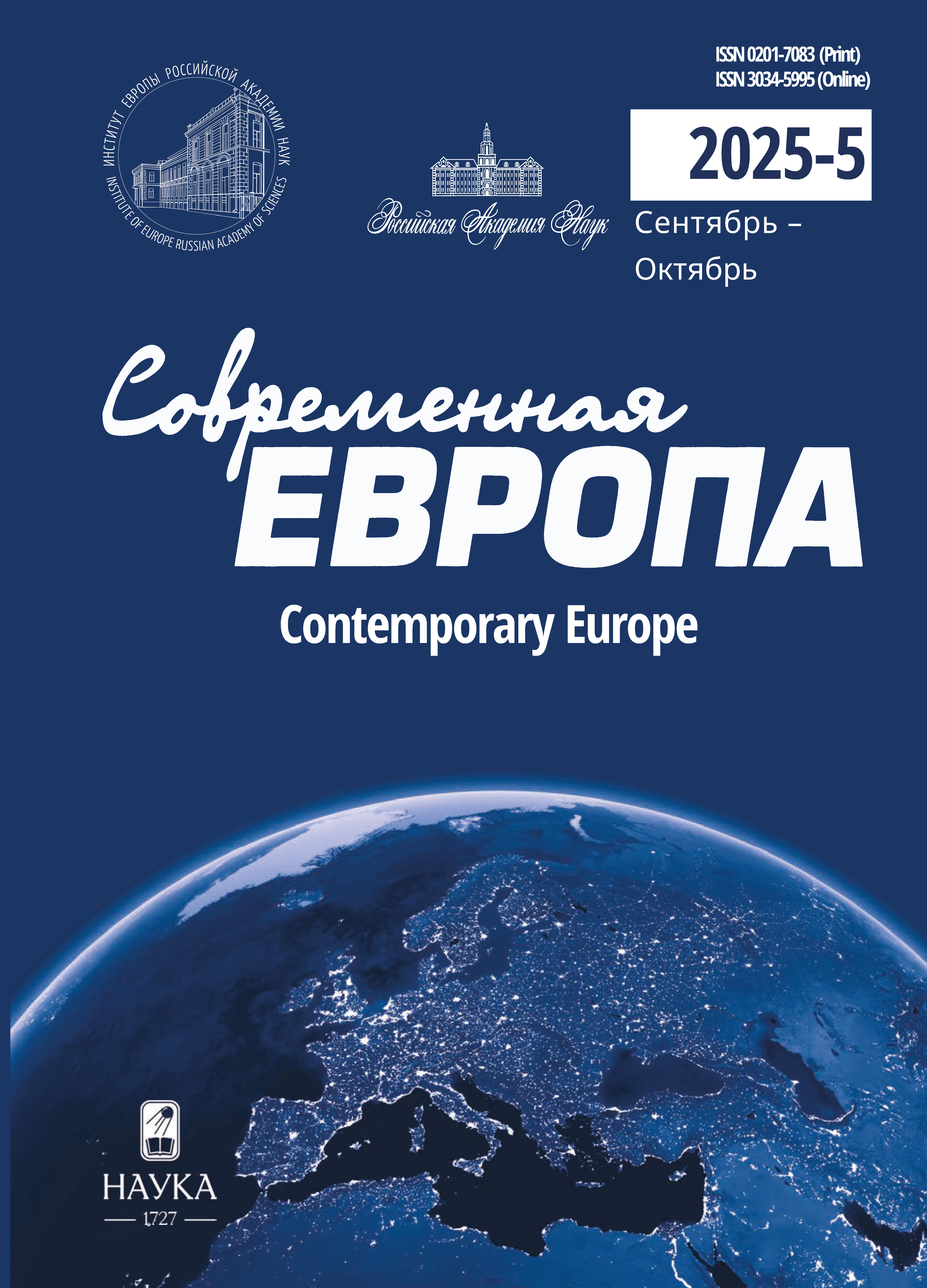The model of interaction of the European Union with partner countries: Swiss experience
- Authors: Babynina L.O.1
-
Affiliations:
- Institute of Europe Russian Academy of Sciences
- Issue: No 7 (121) (2023)
- Pages: 21-34
- Section: Articles
- URL: https://rjsvd.com/0201-7083/article/view/652170
- DOI: https://doi.org/10.31857/S0201708323070021
- EDN: https://elibrary.ru/RYDNCX
- ID: 652170
Cite item
Abstract
Over the past decades, the European Union has formed several formats of integration with the third countries, which are considered as forms for external differentiation. The EU seeks to streamline relations with partners by linking access to its internal market with obligations to dynamically adapt their national legislation to EU norms and rules. These actions can be viewed through various theoretical frameworks: Europeanization, differentiation, institutionalism, external management and others. The purpose of the article was to study the peculiarities of relations between Switzerland and the EU at the present stage, due to the Alpine republic’s refusal of the draft bilateral Institutional Agreement, which assumed the deepening of the institutional structure and greater automation in the implementation of EU law into the national law of the Swiss Confederation. The country's leadership's refusal to ratify the agreement confirms that the idea of preserving national sovereignty and the principle of direct democracy for Switzerland turned out to be more important than the economic benefits of deepening integration with the EU. Thus, taking into account the experience of the United Kingdom, not each of the EU's close partners is ready to sacrifice their national powers in exchange for benefits from deeper access to the EU market. This happens largely due to the internal traditions and economic potential of the partner states.
About the authors
Lyudmila Olegovna Babynina
Institute of Europe Russian Academy of Sciences
Email: lbabynina@yandex.ru
Moscow, Russia
References
- Бабынина Л.О., Говорова Н.В., Тимошенкова Е.П. (2015) Европейский союз и Швейцария: разнонаправленные векторы сотрудничества. Современная Европа. № 2. С. 34-47. DOI: http://dx.doi.org/10.15211/soveurope220153447
- Трофимова О.Е. (2020) Швейцария и Евросоюз: особенности торгово-инвестиционных связей. Мировая экономика и международные отношения. Т. 64. № 9. С. 96-104. doi: 10.20542/0131-2227-2020-64-9-96-104
- Юданов Ю.И. (2002) Швейцария и Евросоюз: трудные поиски партнерства. Мировая экономика и международные отношения. № 2. С. 75-83.
- Altay S. (2021) Remolding Turkey-EU Relations: The ‘Swiss Model' of Differentiated Integration as an Alternative to the Customs Union? Ankara Üniversitesi SBF Dergisi. Cilt 76. No. 2. P. 493-521. URL: https://dergipark.org.tr/tr/download/article-file/1043537
- Chamon M. (2023) Switzerland's Structural Participation in EU Agencies, Switzerland and the EU. A Challenging Relationship. Ed. by M. Maresceau and Ch. Tobler. Leiden, The Netherlands. P. 165-191.
- Crespo, M. J. (2017) After Brexit…The Best of Both Worlds? Rebutting the Norwegian and Swiss Models as Long-Term Options for the UK, Yearbook of European Law. Vol. 36. P. 94-122. DOI: https://doi.org/10.1093/yel/yex021
- Eckert, S. (2022) ‘Sectoral Governance under the EU's Bilateral Agreements and the Limits of Joint Institutional Frameworks: Insights from EU-Swiss Bilateralism for Post-Brexit Relations with the UK'. Journal of Common Market Studies. Vol. 60. No. 4. P. 1190-1210. DOI: https://doi.org/10.1111/jcms.13315
- Fossum J.E., Quesada M.G., Zgaga T. (2020) The EU's non-members Key principles, underlying logics and types of affiliation. ARENA Report 1/20. URL: ttps://www.eu3d.uio.no/publications/eu3d-reports/eu3d-report-1-fossum.pdf (accessed: 07.09.2023).
- Gstöhl, S. (2015) Models of External Differentiation in the EU's Neighbourhood: An Expanding Economic Community? Journal of European Public Policy. Vol. 22. No. 6. P. 854-870. DOI: https://doi.org/10.1080/13501763.2015.1020834
- Gstöhl S., Phinnemore D. (2019) Introduction: privileged partnerships between the European Union and third states, The Proliferation of Privileged Partnerships between the European Union and Its Neighbours. Ed.by S. Gstöhl and D. Phinnemore. Abingdon: Routledge. P. 1-22.
- Gstöhl S., Phinnemore D. (2021) The future EU-UK partnership: a historical institutionalist perspective, Journal of European Integration. Vol. 43. No. 1. P. 99-115. DOI: https://doi.org/10.1080/07036337.2020.1818074
- Icoz G., Martin N. (2021) Historical Institutionalism and EU-Turkey Relations: Path Dependence and Critical Junctures in the Accession Process, EU-Turkey Relations. Ed. by W. Reiners and E. Turhan. Switzerland: Palgrave Macmillan. P. 83-106. DOI: https://doi.org/10.1007/978-3-030-70890-0_4
- Jenni S. (2018) Which future for EU-Swiss relations? A citizens' perspective. TEPSA Briefs. https://www.tepsa.eu/wp-content/uploads/2018/09/TEPSA-Brief-Sabine-Jenni.pdf (accessed: 07.09.2023).
- Kaddous C. (2019) Switzerland and the EU: current issues and new challenges under the Draft Institutional Framework Agreement, The Proliferation of Privileged Partnerships between the European Union and Its Neighbours. Ed. by S. Gstöhl and D. Phinnemore. Abingdon: Routledge. P. 68-83.
- Kaddous C. (2023) Switzerland and the EU The Failure of the Institutional Agreement from a Legal Perspective, Switzerland and the EU. A Challenging Relationship. Ed. by M. Maresceau and Ch. Tobler. Leiden, The Netherlands. P. 310-336.
- Lavenex, S. (2011) Concentric circles of flexible ‘EUropean' integration: A typology of EU external governance relations, Comparative European Politics. Vol. 9. P. 372-393. doi: 10.1057/cep.2011.7
- Lavenex, S. (2015) The External Face of Differentiated Integration: Third Country Participation in EU Sectoral Bodies. Journal of European Public Policy. Vol. 22. No. 6. P. 836-853. DOI: http://dx.doi.org/10.1080/13501763.2015.1020836
- Piris J-C. (2016) If the UK votes to leave: The seven alternatives to EU membership. London, CER. URL: https://www.cer.org.uk/sites/default/files/pb_piris_brexit_12jan16.pdf
- Vahl, M. and Grolimund, N. (2006) Integration without Membership - Switzerland's Bilateral Agreements with the European Union. Brussels: CEPS. P. 128.
- Walter, S. (2021) Quo vadis, Swiss-European Union relations?', Bruegel Blog. URL: https://www.bruegel.org/blog-post/quo-vadis-swiss-european-union-relations (accessed: 1.10.2023).
Supplementary files











